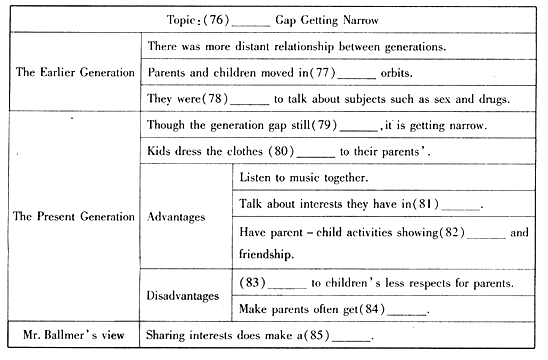题目内容
The ________ after the earthquake is horrible.
- A.sight
- B.scene
- C.view
- D.look
考查名词词义辨析。sight视力,风景;scene风景,风光,布景,指局部的风景、景色展现在人眼前的景象;view视野,视域,常指在远处或高处以人的角度看到的景色;look看。

 阅读快车系列答案
阅读快车系列答案Patti discovered the meaning of running when she was 23. At that time she was smoking two packs of cigarettes a day and had 36 over 50 pounds. “I decided to 37 ,” she says. She took a clock and started 38 what she did every day, and then she 39 an hour a day as a “be nice to Patti” hour. “I started having bubble(泡沫)baths with a candle 40 , because Cosmopolitan Magazine 41 that this would be good for me. But I got 42 of that soon,” Patti remembers. She wanted to do something really pleasant. She found that the 43 times in her life were times when she was physically active. So she took up 44 .
She decided to start 45 the next day. She ran for an hour, 46 a total of 7 miles on her first run. “I couldn’t walk for 2 weeks 47 I felt painful all over!” Patti recalls. “But I felt so wonderful!” Patti wasn’t crazy about running yet, but she was in 48 with the after effects of it.
Within seven months, Patti had run her first marathon, qualified for the Boston Marathon, and placed 25th in the world for 49 distance runners. Over the next years, she 50 records and set standards for women in the sport. She was the first American woman to run a marathon 51 than 2 hours 30 minutes, and then broke another two records 52 an 8-month period.
Patti believes that, if we can 53 standards for ourselves, we can pull ourselves out of the most difficult 54 and come out on top. “Everybody has to be a/an 55 and everybody has that in them.”
| 【小题1】 |
|
| 【小题2】 |
|
| 【小题3】 |
|
| 【小题4】 |
|
| 【小题5】 |
|
| 【小题6】 |
|
| 【小题7】 |
|
| 【小题8】 |
|
| 【小题9】 |
|
| 【小题10】 |
|
| 【小题11】 |
|
| 【小题12】 |
|
| 【小题13】 |
|
| 【小题14】 |
|
| 【小题15】 |
|
| 【小题16】 |
|
| 【小题17】 |
|
| 【小题18】 |
|
| 【小题19】 |
|
| 【小题20】 |
|
Parents and kids today dress alike, listen to the same music, and are friends. Is this a good thing? Sometimes, when Mr. Ballmer and his 16-year-old daughter, Elizabeth, listen to rock music together and talk about interests both enjoy, such as pop culture, he remembers his more distant relationship with his parents when he was a teenager.
“I would never have said to my mom, ‘Hey, the new Weezer album is really great. How do you like it?’” says Ballmer. “There was just a complete gap in taste.”
Music was not the only gulf. From clothing and hairstyles to activities and expectations, earlier generations of parents and children often appeared to move in separate orbits.
Today, the generation gap has not disappeared, but it is getting narrow in many families. Conversations on subjects such as sex and drugs would not have taken place a generation ago. Now they are comfortable and common. And parent—child activities, from shopping to sports, involve a feeling of trust and friendship that can continue int0 adulthood.
No wonder greeting cards today carry the message, “To my mother, my best friend.”
But family experts warn that the new equality can also result in less respect for parents. “There’s still a lot of strictness and authority on the part of parents out there, but there is a change happening,” says Kerrie, a psychology professor at Lebanon Valley College. “In the middle of that change, there is a lot of confusion among parents.”
Family researchers offer a variety of reasons for these evolving roles and attitudes. They see the 1960s as a turning point. Great cultural changes led to more open communication and a more democratic process that encourages everyone to have a say.
“My parents were on the ‘before’ side of that change, but today’s parents, the 40-year-olds, were on the ‘after’ side,” explains Mr. Ballmer. “It’s not something easily accomplished by parents these days, because life is more difficult to understand or deal with, but sharing interests does make it more fun to be a parent now.”
【小题1】The underlined word gulf in Para.3 most probably means _________.
| A.interest | B.distance | C.difference | D.separation |
| A.Parents help their children develop interests in more activities. |
| B.Parents put more trust in their children’s abilities. |
| C.Parents and children talk more about sex and drugs. |
| D.Parents share more interests with their children. |
| A.more confusion among parents | B.new equality between parents and children |
| C.1ess respect for parents from children | |
| D.more strictness and authority on the part of parents |
| A.follow the trend of the change | B.can set a limit to the change |
| C.fail to take the change seriously | D.have little difficulty adjusting to the change |
| A.describe the difficulties today’s parents have met with |
| B.discuss the development of the parent—child relationship |
| C.suggest the ways to handle the parent—child relationship |
| D.compare today’s parent—child relationship with that in the past |
